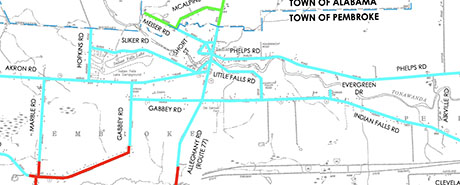
The Town of Pembroke is wasting no time in accepting a grant and low-interest loan from USDA's Rural Development division because it is such a good deal.
"I’ve been doing this for many years," said Tom Carpenter, an engineer with Clark Patterson Lee. "This is the best funding package I’ve ever seen from Rural Development. We were requesting about a $2.3 million grant and I forget the interest rate when we were requesting this but it might have been 2 or just over 2 percent. They came back with a grant of $3.7 million and an interest rate of 1.25, that is the best I’ve ever seen."
The bigger grant and lower interest rate will save property owners in the proposed Water District #4 (see map above) about $90 a year from the original estimate.
At the town board's meeting last week, the board voted to accept the package from USDA and contract with Clark Patterson Lee for services associated with getting the water service designed and built.
Typically, there would be a public information meeting about the proposed district but due to COVID-19-restrictions, but Carpenter anticipates newsletters going to residents and business owners in the district along with survey cards to gauge interest in forming the district.
Both Carpenter and Supervisor Thomas Schneider Jr. said they believe there is widespread support for the formation of the district in the community.
Carpenter said at a previous public meeting where he discussed the district, about 120 people turned out (before the pandemic) and only four or five people there opposed the district.
"You usually get people who are very, very for a district or very, very against it," Carpenter said.
There will be a public hearing on formation of the district at a future date.
Schneider said given the positive feedback he's received from residents, he believes the board will be able to approve the formation of the district with a permissive referendum, which would mean the district would move forward unless affected residents or property owners held a successful petition drive placing the proposal on a public ballot. In that case, voters would need to approve formation of the district.
Schneider said the annual cost of the district for a single, occupied dwelling would be $962 per year. The cost of debt for a residential property that is not developed would be $466 per year. A vacant lot would pay about half that amount. Agricultural properties are exempt from paying for debt service on a water district.
The total cost of the project would be $9,050,000, with $3,744,000 covered by a USDA grant, and the rest by a low-interest loan of $5,306,000.
"I can easily stand up at a public meeting and say there will never be a better funding package available for this project," Carpenter said.
The project would involve installing 109,000 linear feet of 6-, 8-, and 12-inch diameter water mains and providing for 302 water services.
Carpenter said the best-case scenario is the entire project is completed by the end of 2022.
